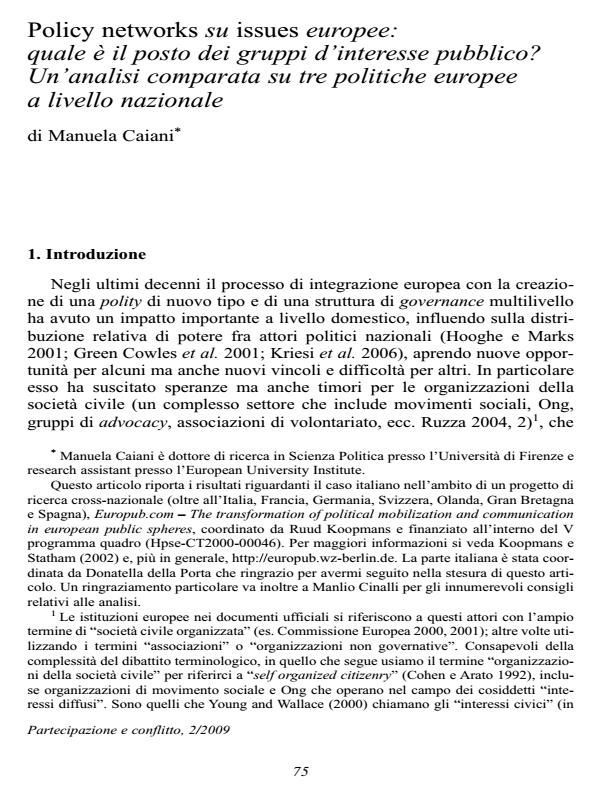Policy networks su issues europee: quale è il posto dei gruppi d’interesse pubblico? Un’analisi comparata su tre politiche europee a livello nazionale
Journal title PARTECIPAZIONE E CONFLITTO
Author/s Manuela Caiani
Publishing Year 2009 Issue 2009/2
Language Italian Pages 36 P. 75-110 File size 1495 KB
DOI 10.3280/PACO2009-002004
DOI is like a bar code for intellectual property: to have more infomation
click here
Below, you can see the article first page
If you want to buy this article in PDF format, you can do it, following the instructions to buy download credits

FrancoAngeli is member of Publishers International Linking Association, Inc (PILA), a not-for-profit association which run the CrossRef service enabling links to and from online scholarly content.
Policy networks on European Issues: Which place for the public interest groups? A comparative analysis on three European policies at a national level - In this article, we analyse the impact of Europeanisation on domestic actors, by looking at how Europeanisation affects the configurations of power and coalitional dynamics at the domestic level. Focusing on the Italian case, with the help of social network analysis and on the basis of 80 semi-structured interviews, we shall look at networks of alliance, disagreement and target among political actors that mobilise on European issues within three specific policy areas (European integration, agricultural policy and immigration and asylum policy), focusing in particular on the role that social movements and NGOs play in these networks (are they central? Are they peripheral? Who play a role as ‘broker’?). In fact, processes of Europeanisation can destabilise the configuration of power in public policies and the relative structure of policy networks, weakening stable and ‘dominant’ actors while strengthening others and opening ‘windows of opportunity’. We also explore the formation of specific coalitions between social movements and NGOs and the other actors, as well as the cleavages around which the debate on Europe is structured and which can influence the path of Europeanisation of national collective actors. Observing these networks, our research recognises the importance that the multilevel structure of the EU creates in terms of offering new opportunities and organisational resources to actors, yet also acknowledges the crucial importance of meso-levels of decision-making, the dynamics of interaction between actors in the same context, and their subjective interpretations. Keywords: social networks; social movements; Ngo; Europe; multilevel governance
Manuela Caiani, Policy networks su issues europee: quale è il posto dei gruppi d’interesse pubblico? Un’analisi comparata su tre politiche europee a livello nazionale in "PARTECIPAZIONE E CONFLITTO" 2/2009, pp 75-110, DOI: 10.3280/PACO2009-002004